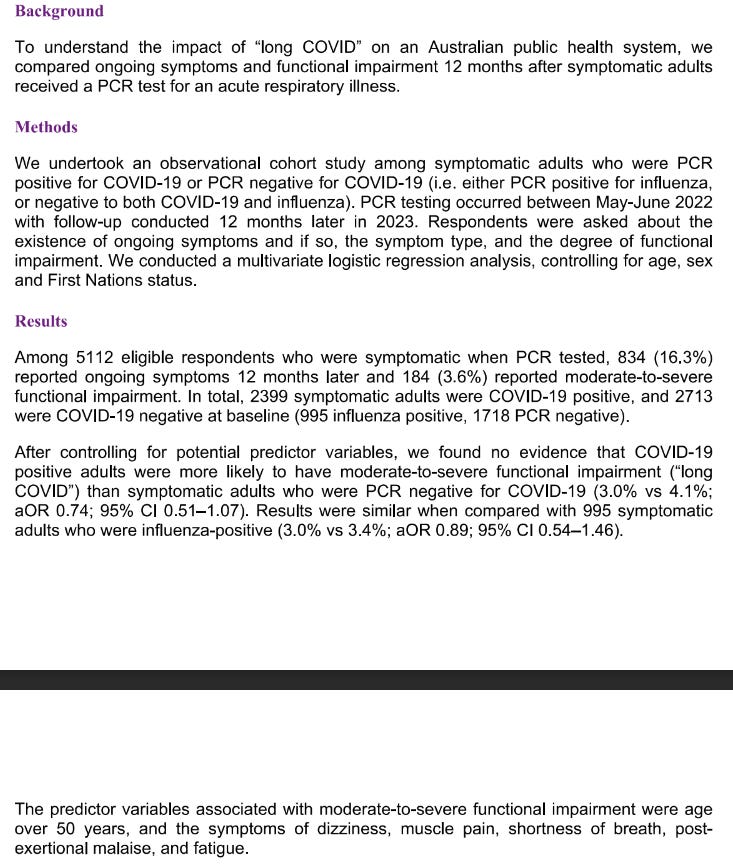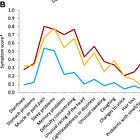Why are so many people disingenuous regarding Long COVID?
Skepticism regarding prevalence of Long COVID has strangely led to flat-out denial of Long COVID entirely.
For those who have followed my work you will be aware that I try to avoid taking extreme positions in my writing. I like to examine things from a position of nuance, and because of that there are many times where I cannot provide definitive answers but rather things to consider when evaluating information.
That has been made rather clear when it comes to Long COVID- I have avoided making any clear claims regarding how many people may be suffering from Long COVID while also arguing that Long COVID is a real phenomenon. This is mostly due to the fact that post-viral syndrome has been completely overlooked by the medical establishment for many decades, likely because most symptoms of post-viral syndrome manifest in women and therefore were disregarded as being psychosomatic in nature (i.e. women be cray cray).
And because of this lack of prior information the presentation of Long COVID would appear to be a unique phenomenon, owed to the fact that there were no clear rates of post-viral syndrome to compare Long COVID with, hence why getting an actual quantitative measure of Long COVID has been difficult.
But instead of viewing this lack of information as a limitation in assessing Long COVID rates, it seems as if this has led people to improperly make the argument that Long COVID doesn’t exist.
I have been critical of this position due to the fact that absence of evidence is not evidence of absence. Just because we don’t have clear rates of post-viral syndrome doesn’t mean that Long COVID itself is made up, but that still hasn’t stopped many people from making such claims anyways.
One rather recent example is Alex Berenson who wrote this article a few weeks ago:
The release of this article is pretty ironic because it came at the same time that I wrote an article criticizing a widely reported study on intermittent fasting and cardiovascular-related deaths since the study itself was not publicly available, and with information regarding this study only coming from a presentation at a conference:
And that’s mostly because the alleged study that Berenson is citing isn’t available yet, and appears to be part of a presentation for a conference called the European Congress of Clinical Microbiology and Infectious Diseases (ECCMID) that is occurring later in the month.
The only information available is a link to a Google Drive Document with a brief summary of the study.
Again, it’s a bit ironic that we have two studies here in which not all of the information is fully available, and some of the same people who may criticize the intermittent fasting study for not being fully available may be quick to agree with the study that Berenson cited- remember that irrespective of our opinions we should be consistent in our criticisms.
The information that is presented also isn’t distinct from other studies which I have previously criticized. The available information doesn’t tell us much regarding the methodology used, the demographics of the participants, and anything else that would provide better context for evaluating the study:
Note that there isn’t any mention of how often follow-up occurred (we may infer that only one follow-up a year afterward occurred based on the language), what follow-up was conducted, etc. Nothing that can evaluate the robustness of this study. Again, it seems more in-line with other Long COVID studies which have come out that I have also criticized for poor methodology- I’ll link some of those other posts at the end of this one.
Because of these limitations in available information it’s a bit of a stretch to consider this study to be validation that Long COVID doesn’t exist- there’s hardly anything available for us to evaluate and parse as good study methodologies.
And even if this study is argued to be a good, valid study, it doesn’t suggest that Long COVID isn’t real- it just argues that rates of Long COVID may be on par with post-viral syndromes related to other respiratory infections:
But this doesn’t appear to have stopped Berenson from making a post suggesting something different than what the study alleges.
Long COVID Sleight of Hand
Over time I have found that I’ve grown rather frustrated with the discussion surrounding Long COVID.
This is partially due to the fact that most people who have likely denied the existence of post-viral syndrome are likely the same people to argue that Long COVID doesn’t exist. Many of the people in power who are part of the medical establishment are likely the same people who denied or downplayed post-viral syndrome, leading to lack of research into this field and the creation of a large blind spot in what we know of longterm consequences from viral infections.
And it’s only through COVID that scientists are now raising questions regarding whether there is such a thing as “Long Flu”:

Hence, it’s why semantic arguments regarding the name “Long COVID” in lieu of post-viral syndromes seem disingenuous- the same people who have pretended that post-viral syndrome doesn’t exist can’t come out now suggesting that rates of Long COVID are comparable to other viral infections! Because to admit that Long COVID is comparable to rates of post-viral syndromes from other respiratory infections would admit that post-viral syndromes have always been a reality!
This isn’t to say that the authors of this current piece have made such claims, but it’s strange to see the goalpost being moved, including among vaccine critics, from denying that Long COVID isn’t real to the fact that Long COVID is just comparable to other upper respiratory infections.
As to why this sort of disingenuous game is at play, I don’t have an answer to that but I suspect that one driving reason is that denying the existence of Long COVID means that there is no justification for the forced mandates and vaccinations.
If that’s the case I find this to be a poor argument because forcing vaccination and lockdowns is evil irrespective of the reasons for it. We can simultaneously argue that Long COVID is real while also suggesting that it doesn’t serve as a valid justification for any of the draconian policies that have been inflicted upon us.
This is something that Brian Mowrey has covered recently and has gotten criticism over, whereby he has argued that there may be people who have benefited from the vaccines, and even if that’s the case that still doesn’t justify forcing vaccines onto people:
We shouldn’t avoid ideas or concepts because we think it would give our so-called opponents a leg up. We shouldn’t avoid things that make us feel uncomfortable, and we certainly shouldn’t be avoiding things because it makes it easier for us to think, especially if it further entrenches us into our echo chamber.
Other Posts to Consider:

If you enjoyed this post and other works please consider supporting me through a paid Substack subscription or through my Ko-fi. Any bit helps, and it encourages independent creators and journalists such as myself to provide work outside of the mainstream narrative.













Thanks. Just like some people take forever to get over a simple cold, I would expect some to have a hard time with this mess. I think it is ignorance - or intellectual laziness - on Berenson's part. But certainly a slap in the face to those who are suffering.
Good article.
It seems that if there's not a test for it, or if it doesn't show up on the blood tests or other tests already used, then it doesn't exist. But medical diagnoses are full of descriptions of symptoms - without clear known causes. And there's plenty of drugs that treat the symptoms, but can't treat the causes if they are not known.
A question I have is how many people in the transfected and untransfected groups have symptoms described as long covid. The transfection-vaccine has long-term side effects for some people, and I think it's hard to weed out symptoms from infection, and symptoms from this pharmaceutical product.